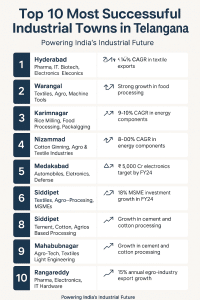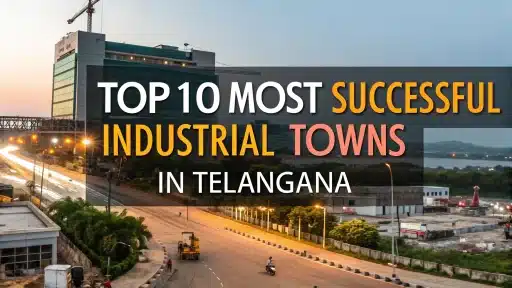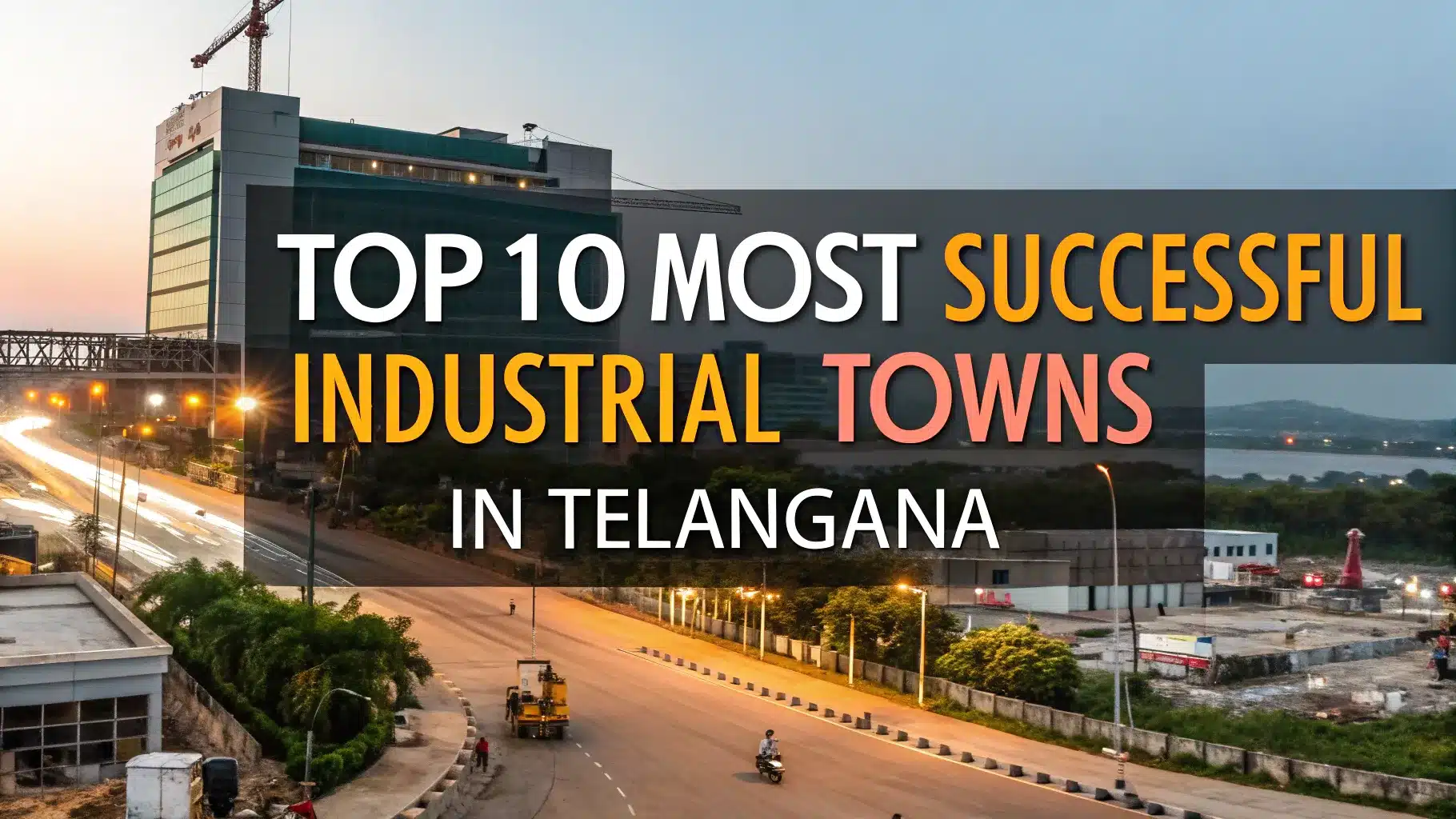Telangana: An Emerging Industrial Powerhouse
The new Indian state of Telangana is quickly establishing itself as an industrial powerhouse of the country. Telangana offers fertile ground for manufacturing, agro-processing, textiles, and pharmaceuticals. Rising investments and rapid infrastructure development are actively transforming the state into India’s third economic powerhouse.
In this article, we highlight the other important industrial hubs and their primary sectors. We also discuss the impact of these industrial hubs on the manufacturing economy of India, as well as the other broader market trends.
For more information: Business Ideas and Investment Opportunities

Hyderabad: The Industrial Leader of Telangana
As the capital city, Hyderabad is and continues to be the leading industrial development city of Telangana. In the area of traditional manufacturing, the city continues to maintain and strengthen its market position. Over the last decade, Hyderabad has emerged as a national center for pharmaceuticals, electronics, aerospace and defense industries, and precision engineering.
The Balanagar, Patancheru, and Sanath Nagar industrial zones in Hyderabad have developed Genome Valley, India’s first organized biotech cluster, as well as HITEC City, which incorporates IT and manufacturing as vital components to Industry 4.0.
Market Outlook: Pharma exports from Telangana exceeded ₹1 lakh crores in 2024, with Hyderabad-based units as major contributors. These units will drive demand in the biotech industry, which has seen growth rates of 12 to 14 percent CAGR. Moreover, the TS-iPASS incentives as well as the plug-and-play industrial parks make Hyderabad’s manufacturing greater than ever.
Related: IT-Integrated Manufacturing in Telangana: A Growth Story
Warangal: Reviving Heritage through Industrial Progress
The former cultural capital of the Kakatiya dynasty, Warangal, is now a major manufacturing center in Northern Telangana. Along with the famed historic sites, Warangal is experiencing a surge in the textile, machine tool, and agro industries. One of the largest textile parks in South India, the Warangal Textile Park, is now a major center of investment.
Warangal, in addition to being part of the Hyderabad-Warangal Industrial Corridor, is a center of the National Investment and Manufacturing Zones and state-sponsored industrial parks, which greatly increases the region and the city’s logistical value.
Market Outlook: Increased FDI, expanding logistics infrastructure, and the adoption of smart manufacturing technologies are driving the textile sector in Warangal to grow at an estimated 10% CAGR until 2030. The presence of handloom clusters, particularly in Hanamkonda and Kazipet, gives it a foothold in both traditional and modern textile production.
Karimnagar: Strengthening Agro-Processing and Food Manufacturing
Karimnagar thrives on its strong agricultural base, making it an ideal location for agro-based and food processing industries. The district has emerged as a leader in rice milling as well as in the dairy processing and packaging industries. Because of the rural industrialization focus in the region, Karimnagar’s industrial growth has also spurred development in surrounding towns.
The ready availability of agricultural raw materials throughout the year and the presence of new industrial parks like the Jammikunta Food Park make Karimnagar increasingly pivotal to the agri-industrial map of Telangana.
Market Outlook: Industry experts anticipate India’s food processing sector will reach USD 535 billion by 2025, driven by rising demand and supportive government policies. With its raw material advantage and strong government support, Karimnagar actively drives growth in value-added agri-products and boosts export potential.
Check out our Handbooks for more information
Khammam: Energizing Industries in Telangana
Khammam has emerged as an industrial hub on account of its thermal power stations and heavy electrical engineering machinery production units, as well as its power generation and engineering units. Alongside the thermal power stations, Khammam also has heavy electrical machinery manufacturing units and various energy-related services.
The region is now expanding into the cement as well as construction equipment industries. The region also enjoys primary and secondary raw materials such as cement-grade limestone, together with trained personnel from the nearby technical colleges.
Market Forecast: India aims to achieve 500 GW of non-fossil fuel capacity by 2030. This aims to put Khammam to further use as an industrial hub. The surge in renewable energy is driving the region to experience compound growth in affiliated industries, including component manufacturing and grid infrastructure services.
Nizamabad: Widening the Scope of Industrialization in Textiles and Agro-Related Industries
As history has shown, the northern part of Telangana and Nizamabad is rich in cotton and agro-based production. This area has built its reputation on rice milling and food processing units and has actively expanded its industrial portfolio by adding cotton ginning and textile industries.
Additionally, the government has included the region in proposed industrial corridors to bridge rural areas with global trade markets. Furthermore, skill centers and logistics parks in the region actively boost the growth of SMEs and attract large industrial players.
Market Outlook: Moreover, the cotton-based industries in Nizamabad are projected to expand at a rate of 8–9% annually until 2028. Meanwhile, the agro-processed units are benefiting from rising domestic demand and growing exports of packaged foods and spices.
Related: Top 18 Industrial Business Ideas for Startups and Entrepreneurs
Medak: Evolving as an Innovation-Centric Industrial District
The Medak district has an automobile and defense manufacturing industry, which, along with electrical and electronic equipment, has further diversified the region. Medak is rapidly emerging from a rural economy to an industrial region and the evolution is promising.
Market Outlook: Consequently, Medak is set to be at the forefront of the expansion of investment in Telangana and is projected to account for ₹5,000 crores in electronic manufacturing by 2027. Furthermore, the region stands to gain from the offset policy for defense manufacturing as well.
Siddipet: Industrial Zone with Rapid Growth for MSMEs
The new industrial areas for agro, textiles, and small manufactures, alongside MSMEs, have marked Siddipet as a fast-tracked region for industrial growth. Moreover, the geolocation of Siddipet offers a strategic advantage for the development of Hyderabad and Warangal, alongside access to government-driven cluster development programs.
The focus of the government is to encourage industrial development at the district level, which is supporting SSPP and T-IDEA, thus making Siddipet a new industrial hub for emerging entrepreneurs.
Market Outlook: Investments in MSME Telangana surged by 18% in FY24 and Siddipet led in textile processing along with value-added food products. This growth is expected to continue with the construction of rural industrial corridors.
Adilabad: Rising Industrial Town in Northern Telangana
Adilabad is becoming an emerging industrial hub with an increasing focus on cement, agro, and cotton textile industries. Its access to Maharashtra and Chhattisgarh also favors interstate commerce.
The shift to an agro-industrial economy is supported by the development of logistics parks and new industrial clusters, enabling a sharpened focus on non-agricultural activities.
Market Outlook: Adilabad is strategically equipped to support both Telangana and central India with cement, expecting an annual growth of 7–8% in demand. Additionally, the state is fostering value chain construction for cotton from the region.
For more information, check out this video
Mahabubnagar: Strategic Industrial Center with Agro-Tech Focus
Mahabubnagar is becoming a critical part of Telangana’s industrial map through its stronghold in agro-based, textile, and light machinery sectors. Its proximity to NH-44 and Hyderabad has catalyzed industrial investment in processing, warehousing, and rural entrepreneurship.
With upcoming mega food parks and integrated logistics hubs, Mahabubnagar is on a steady path toward becoming a diversified industrial economy.
Market Outlook: Telangana’s agro-industry exports are set to grow by 15% annually through 2030, and Mahabubnagar is expected to be a primary contributor due to its processing capacity and strategic logistics location.
Rangareddy: A Satellite Town Turning into an Industrial Magnet
Rangareddy, bordering Hyderabad, has gained prominence as an industrial suburb. It hosts a multitude of industries, including pharmaceuticals, logistics, precision tools, textiles, and IT manufacturing. The availability of land, excellent road connectivity, and industrial SEZs make it a high-potential district for scalable ventures.
Rangareddy has become an extension of Hyderabad’s industrial base, benefiting from the spillover of talent, infrastructure, and investment. Several pharma giants and electronics companies have set up large facilities here.
Market Outlook: Pharma and electronics industries in Rangareddy are expected to grow at a CAGR of 10–12% over the next five years. The upcoming Pharma City project will further accelerate this trajectory.
Find the Best Ideas for Yourself with our Business Selector Tool
Conclusion: Telangana’s Industrial Future Looks Promising
Telangana’s industrial towns are not just economic zones; they are ecosystems fostering innovation, employment, and investment. From the technologically advanced corridors of Hyderabad and Medak to the agro-based strengths of Karimnagar and Mahabubnagar, the state’s industrial diversity is its core strength.
The Telangana government’s proactive policies—such as TS-iPASS, dedicated industrial parks, and plug-and-play facilities—are paving the way for inclusive, decentralized industrialization. With a projected GSDP growth rate of over 12% annually and increased focus on exports, Telangana is poised to become a national and global manufacturing powerhouse.
As entrepreneurs and investors look toward emerging industrial regions, Telangana’s top industrial hubs offer a blueprint for sustainable and profitable industrial development.







